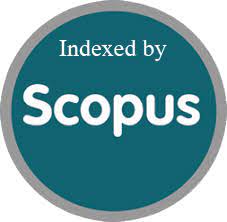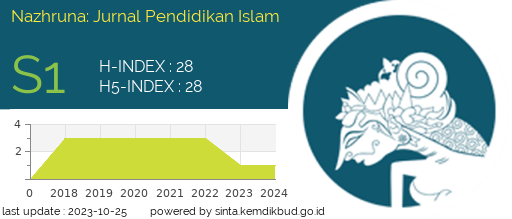The Effectiveness of Al-Quran Memorization Methods for Millennials Santri During Covid-19 in Indonesia
Abstract
This research discussed the effectiveness of memorizing the Koran online for the Muslim millennial generation in Indonesia. The success of memorizing Allah's word for the Muslim generation in the millennial era is greatly influenced by the learning and training system. One aspect of learning is selecting and applying methods that are believed to be useful in memorizing the Koran. To obtain material for discussing this theme, we have conducted a series of data searches through Google Scholar and the Education Research Information Center. After the data is collected, it is then analyzed critically, involving in-depth coding and interpretation systems. The data analysis process begins with an understanding of the problem's theme and is then linked with data that will answer questions before being taken as findings with validity and reliability principles. By paying attention to the literature and publication review data about the effectiveness of the memorization method, it can be concluded that our findings include that the method of memorizing the Koran is practically very useful in learning in the Quran memorization foundation with all the advantages of this online web application. Thus these results will add new knowledge for many parties.
Downloads
References
Abdi, Muhammad Iwan. “The Implementation of Character Education in Kalimantan, Indonesia: Multi Site Studies.” Dinamika Ilmu 18, no. 2 (2018): 305–21.
Alebaikan, Reem A. “Perceptions of blended learning in Saudi universities,” 2010.
Ariffin, Sedek, S. Amir, M. Abdullah, I. Suliaman, K. Ahmad, F. Deraman, F. Ahmad Shah, Mohd Yusoff, Mohd Yakub, dan M. M. Abd Razzak. “Effective techniques of memorizing the Quran: a study a Madrasah Tahfiz Al-quran, Terengganu, Malaysia.” Middle-East Journal of Scientific Research 13, no. 1 (2013): 45–48.
Aslan. “Dinamika Pendidikan Islam Di Zaman Penjajahan Belanda.” SYAMIL: Jurnal Pendidikan Agama Islam (Journal of Islamic Education) 6, no. 1 (12 Mei 2018): 39–50. https://doi.org/10.21093/sy.v6i1.1024.
———. “Peran Pola Asuh Orangtua di Era Digital.” Jurnal Studia Insania 7, no. 1 (2019): 20–34. http://dx.doi.org/10.18592/jsi.v7i1.2269.
Aslan, Agus Setiawan, dan Hifza. “Peran Pendidikan dalam Merubah Karakter Masyarakat Dampak Akulturasi Budaya di Temajuk.” FENOMENA 11, no. 1 (2019): 11–30. https://doi.org/10.21093/fj.v11i1.1713.
Astuti, Ni Nyoman Sri, Gede Ginaya, dan Ni Putu Wiwiek Ary Susyarini. “Designing Bali tourism model through the implementation of tri hita karana and sad kertih values.” International journal of linguistics, literature and culture 5, no. 1 (2019): 12–23.
Dewi, Fitria Arifia. “Becoming hamil al-Qur’an: a Case study of memorizing Qur’an among boarding students at MAN 3 Kediri.” PhD Thesis, Universitas Islam Negeri Maulana Malik Ibrahim, 2019.
Dhawan, Shivangi. “Online learning: A panacea in the time of COVID-19 crisis.” Journal of Educational Technology Systems 49, no. 1 (2020): 5–22.
Habibi, Rozaq. “Implementasi Metode Pembelajaran Tahsin Al-QUran Siswa MTS Al-Munawaarah Binjai Keluarahan Nangka Kecamatan Binjai Utara Kota Binjai Provinsi Sumatera Utara.” PhD Thesis, Universitas Islam Negeri Sumatera Utara, 2020.
Hasanah, Nur. “Dampak Pandemi Covid-19 terhadap Proses Pembelajaran di Taman Pendidikan Al-Qur’an (TPQ).” Jurnal Riset Dan Pengabdian Masyarakat 1, no. 1 (2021): 70–88.
Hayati, Nur. “Pembelajaran Jarak Jauh Selama Pandemi di Pondok Pesantren Darunajah 2 Bogor.” RESIPROKAL: Jurnal Riset Sosiologi Progresif Aktual 2, no. 2 (2020): 151–59.
Hidayati, Widiani, dan Widia Khumaira. “Pembelajaran Tahfizul Quran di Masa Pandemi Covid-19 (Studi Kasus di Pesantren Tahfiz Daarul Quran Takhasus II Cikarang Jawa Barat).” Khazanah: Jurnal Mahasiswa 12, no. 1 (2020).
Houghton, Catherine, Kathy Murphy, David Shaw, dan Dympna Casey. “Qualitative case study data analysis: An example from practice.” Nurse researcher 22, no. 5 (2015).
Imrayani, Firma. “Metode Sima’an Pondok Pesantren Tahfidz Qur’an (PPTQ) Halaqah Hafizah Al-Imam Ashim Putri, Kampus 3 Skarda N II No. 3 Kelurahan Gunungsari, Kecamatan Rappocini, Makassar.” PhD Thesis, Universitas Islam Negeri Alauddin Makassar, 2020.
Lubis, Rahmat Rifai, Muhammad Ali Hanafiah, Dewi Sartika, Anggie Arrumaisyah Hasibuan, dan Kamal Hadi Nawawi. “TAḤFĪẒ ONLINE.” Jurnal Pendidikan Islam 9, no. 2 (2019): 60–75.
Maloney, Divine, Guo Freeman, dan Andrew Robb. “A Virtual Space for All: Exploring Children’s Experience in Social Virtual Reality.” Dalam Proceedings of the Annual Symposium on Computer-Human Interaction in Play, 472–83, 2020.
Manullang, Sardjana Orba. Sosiologi Hukum. Indonesia: Bidik-Phronesis Publishing, 2019.
Mubarakah, Wardah Wafiyah, dan Erni Munastiwi. “Pelaksanaan Program Tahfidzul Qur’an Berbasis Online Masa Pandemi Covid-19.” TADRIS: Jurnal Pendidikan Islam 15, no. 2 (2020): 184–94.
Mukarromah, Hanifatul. “Resepsi Menghafal Al-Qur’an di Dunia Maya (Studi Living Qur’an Akun Instagram@ Tahfidz_Online),” 2020.
Mundir, Mundir. “The portrait of learning media development of social media based in Islamic boarding school in the pandemic: study on kiai online reciting and santri social media literation in constructing negative contents in the virtual world.” The portrait of learning media development of social media based in Islamic boarding school in the pandemic: study on kiai online reciting and santri social media literation in constructing negative contents in the virtual world, 2020.
Munhamir, Ahmad. “Tajdied Method Implementation in Improving The Quality of Tahfidz Al-Quran Juz 30, 29, and 1 In Sd Muhammadiyah 10 Surabaya.” Studia Religia: Jurnal Pemikiran dan Pendidikan Islam 4, no. 2 (2021).
Murtadlo, Muhamad. “Pembelajaran Daring Pada Masa Pandemi Covid 19 di Lingkungan Pesantren,” 2020.
Mustafa, Nor Musliza, dan Mokmin Basri. “Perbandingan kaedah hafazan al-Quran tradisional dan moden: Satu kajian awal.” Proceedings of the Social Sciences Research, 2014, 827–34.
Putra, Purniadi, Fahrina Yustiasari Liriwati, Tasdin Tahrim, Syafrudin Syafrudin, dan Aslan Aslan. “The Students Learning from Home Experiences during Covid-19 School Closures Policy In Indonesia.” Jurnal Iqra’ : Kajian Ilmu Pendidikan 5, no. 2 (5 September 2020): 30–42. https://doi.org/10.25217/ji.v5i2.1019.
Rohman, Muhamad Zulfar. “FROM PRINT TO SCREEN: METHODOLOGY, MEDIA, AND TRANSITION OF QUR’ANIC LEARNING IN INDONESIA.” Khazanah: Jurnal Studi Islam dan Humaniora 17, no. 2 (2019): 191–208.
Sabri, Ahmad. “Trend Tahfidz House Program ln Early Childhood,” 2012.
Supriyadi, Tedi, dan J. Julia. “The Problem of Students in Reading the Quran: A Reflective-Critical Treatment through Action Research.” International Journal of Instruction 12, no. 1 (2019): 311–26.
Syafrin, Syafrin, dan Muslimah Muslimah. “Problematika Pembelajaran E-learning dimasa Pandemi Covid-19 bagi Santri Pondok Pesantren Al-Hasyimiyyah Kotawaringin Barat.” Jurnal Al Qiyam 2, no. 1 (2021): 10–16.
Syarif, Syarif, dan Nur Kholis. “KEAKTIFAN SISWA DALAM PEMBELAJARAN HAFALAN AL-QUR’AN MENGGUNAKAN ZOOM: STUDI PADA SISWA KELAS 8 SMP AR-RAHMAH MALANG.” Al-Tadzkiyyah: Jurnal Pendidikan Islam 11, no. 2 (2020): 289–307.
Tan, Charlene. Islamic education and indoctrination: The case in Indonesia. Vol. 58. Routledge, 2012.
Tsuroya, Fatia Inast. “Dampak Pembelajaran Online di Tengah Pandemi Covid-19 Terhadap Proses Pembelajaran Metode Yanbu’a di Kelas 2 MI At-Taqwa Bondowoso.” IQ (Ilmu Al-qur’an): Jurnal Pendidikan Islam 3, no. 02 (2020): 199–214.
Wasyik, Torikhul, dan Abdulloh Hamid. “Implementasi E-Learning Dalam Pembelajaran Alquran Era COVID-19 Di Sanggar Tahfidz Entrepreneur Krian Sidoarjo.” EDUDEENA: Journal of Islamic Religious Education 4, no. 1 (2020).
Yusuf, Sri Andayani Mahdi, Mohd Aderi Che Noh, dan Khadijah Abdul Razak. “Tahfiz Teachers Ability in Teaching of the Subject Hifz Quran in Implementing Integrated Curriculum Tahfiz (KBT) Secondary Schools.” INTERNATIONAL JOURNAL OF ACADEMIC RESEARCH IN BUSINESS AND SOCIAL SCIENCES 9, no. 5 (2019).
Zubaidillah, Haris. “STUDY OF ANALYSIS OF DIFFICULTIES OF ELEMENTARY SCHOOL CHILDREN IN MEMORIZING THE KORAN: CASE STUDY MI UMMUL QURA AMUNTAI.” ICISEI 1, no. 1 (2020): 71–88.
Copyright (c) 2021 Sardjana Orba Manullang, Mardani Mardani, Aslan Aslan

This work is licensed under a Creative Commons Attribution-ShareAlike 4.0 International License.










1.jpg)


